5 ingredients is all you need to make this easy Italian cheesecake recipe with fluffy whipped ricotta, lemon zest, and just the right amount of sugar. With no crust and no water bath, this lighter ricotta cheesecake is a great no-fuss dessert for your next gathering!
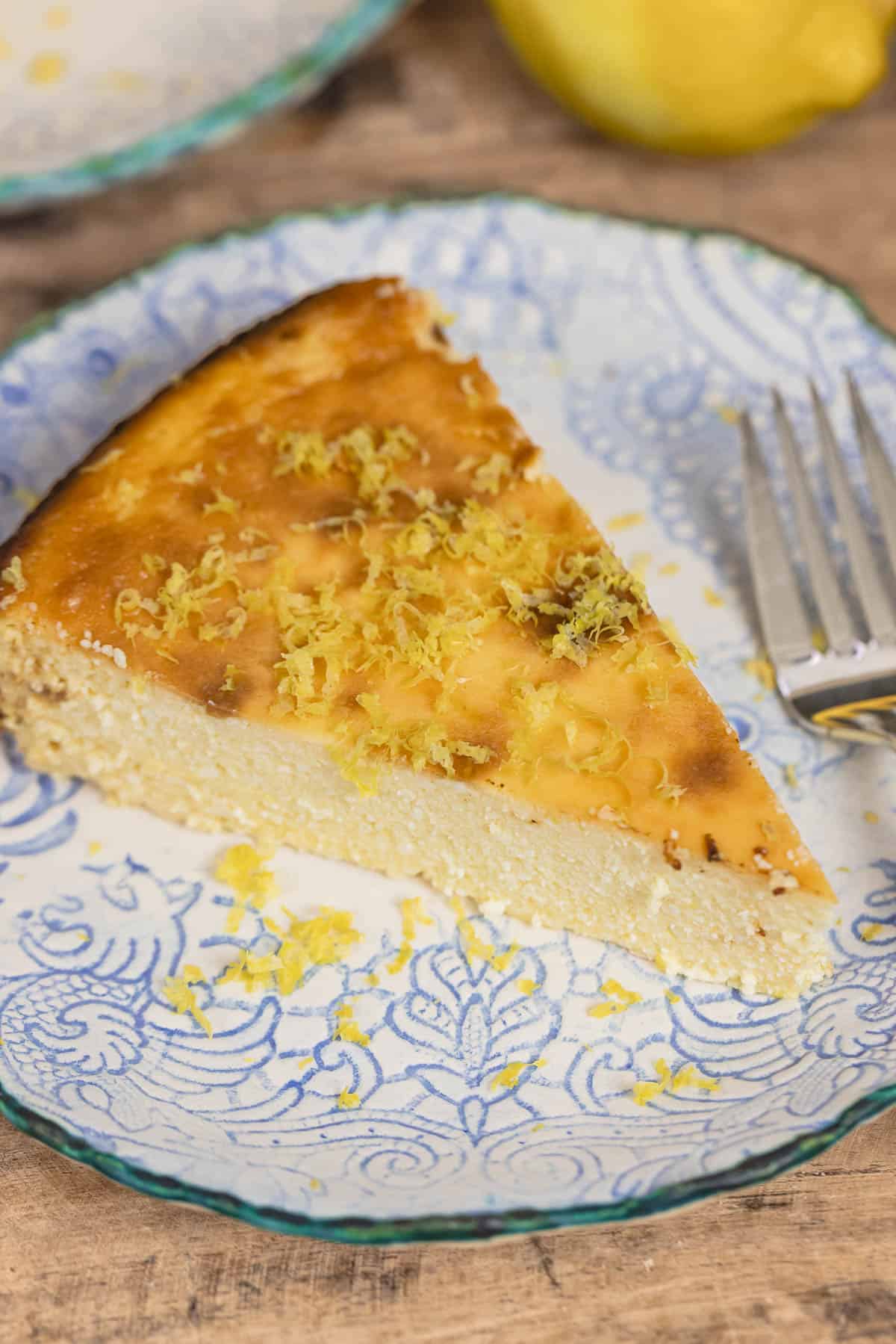
Ricotta cheesecake!
This elegant Italian ricotta cheesecake bridges the gap between those who love a full and dense cheesecake, and others like me who prefer a lighter, more airy cheesecake. Plus, it’s the foundation of my amazing Baklava Cheesecake! A must try once you master this recipe.
The star ingredient here is none other than whole milk ricotta cheese, which is whipped for a good 10 minutes with eggs and sugar, to create an unbelievably indulgent, yet airy and light batter. Not only does this ricotta cake strike just the right balance in terms of texture and flavor, but it is easy to make with just 5 simple ingredients!
And if you thought ricotta should be reserved for savory dishes like eggplant lasagna and baked ziti, this recipe will prove what it can do for your desserts!
How is ricotta cheesecake different from regular cheesecake?
The kind of cheese used makes the biggest difference between Italian ricotta cheesecake and regular cheesecake (or New York-style cheesecake). American cheesecake is made with cream cheese, which is made with milk and cream and will give you a richer, more dense cake.
Versus this Italian cheesecake, which uses ricotta cheese, made with milk only and, therefore, will give you a lighter, more airy cake (similar to Italian Cassata Cake, Greek Yogurt Cheesecake, and this Lemon Ricotta Cake).
Also, another big difference to note here is that this is a gluten-free crustless cheesecake, which contributes to the cake’s lightness, giving you a daintier finish.
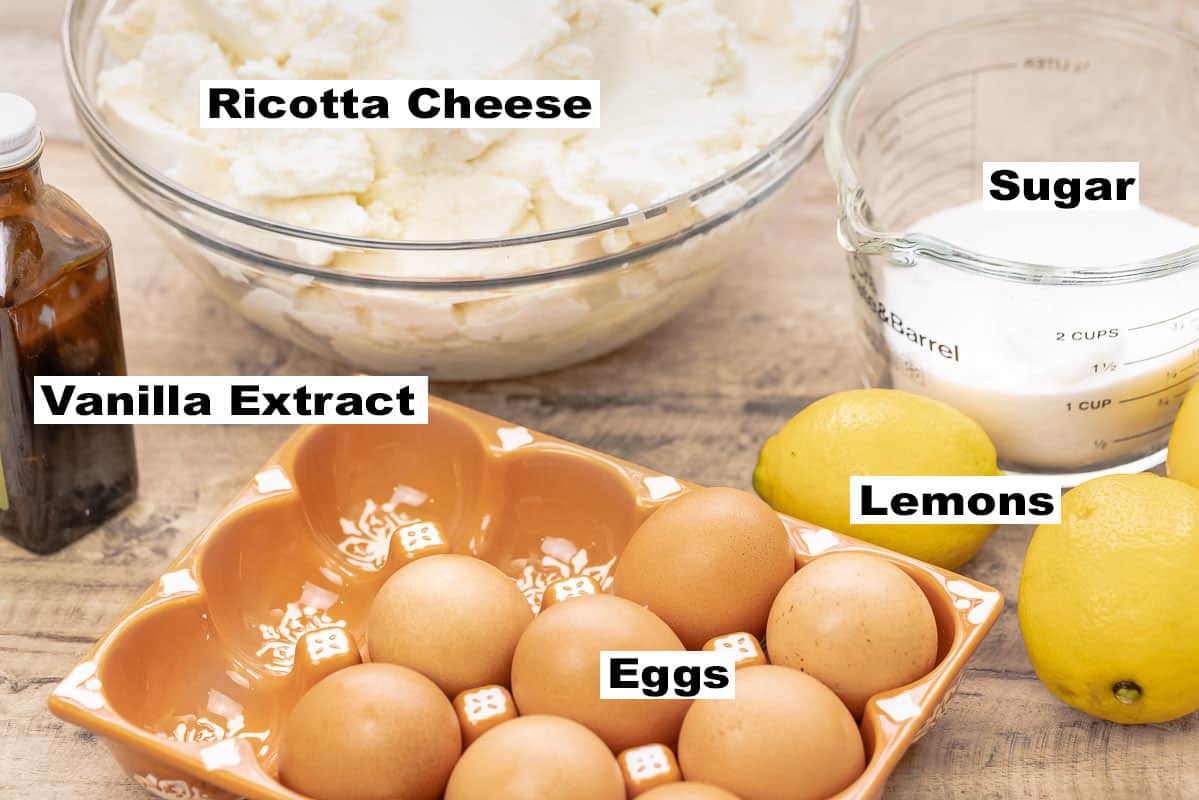
Ingredients and notes for Italian cheesecake with ricotta
You only need 5 ingredients to make this gluten-free ricotta cheesecake recipe:
- Whole milk ricotta cheese – You’ll need 3 pounds of ricotta for this recipe. You can use part-skim ricotta, but whole milk ricotta will give you a better result and a melt-in-your-mouth richness. Be sure to select a quality cheese and drain it well before use (more in this later).
- Eggs – 8 large eggs help to both thicken and smooth the cheesecake batter. You’ll need the egg whites and egg yolks.
- Sugar – I use white sugar, but you can use a sugar replacement as well.
- Vanilla extract – Use pure vanilla extract here, not imitation vanilla or vanilla flavor.
- Lemon zest – You’ll need the zest of 3 lemons to give the ricotta cheesecake the perfect amount of lemony flavor.
- Olive oil – To coat the springform pan so the cheesecake does not stick. If you must use butter instead, that is fine as well, but be sure to use something to coat the pan.
How to make ricotta cheesecake
With a little advance preparation, you can have a show-stopping ricotta cheesecake for your next dinner party. Here’s how you make it (printer-friendly recipe below):
- Strain the ricotta cheese. Place a fine mesh sieve over a bowl. Line the sieve with cheesecloth or two sturdy paper towels. Spoon 3 pounds whole milk ricotta cheese onto the cloth or paper towels, and press firmly with the back of a wooden spoon to release as much liquid as possible into the bowl beneath. Discard the liquid. You can also do this a night ahead and allow the ricotta to drain overnight in the refrigerator.
- Make the Italian cheesecake batter. Grab the bowl of a large standing mixer (fitted with a blade) and add ricotta cheese, 8 large eggs, 1 ¼ cup sugar, 1 teaspoon vanilla extract, and the zest of 3 lemons. Starting on low and increasing to medium-low (2 on a KitchenAid mixer), mix for 10 minutes. The mixture should look light and fluffy. You can also use a hand-mixer (only use the low speed) or a wooden spoon – both will just take more time.
- Bake the ricotta cheesecake. Brush the bottom and sides of a 9-inch springform pan with extra virgin olive oil. Don’t skip this step – your cheesecake will stick to the pan if it is not greased. For better control, place the springform pan on a large sheet pan. Pour the ricotta mixture into the baking pan and give it a little shake.
Bake on the center rack of a 425 degrees F heated oven for 30 minutes. Then reduce the heat to 375 degrees F and bake for 40 to 45 minutes more. The batter should be mostly firm with a slight jiggle, and the top should have a nice golden brown color. - Chill the cheesecake. Remove the crustless cheesecake from the oven and allow it to cool completely. This will take 1 to 2 hours. Then, cover the springform pan with plastic wrap and refrigerate for at least 6 hours. (Note that chilling the cheesecake overnight is best, if you have the time.)
- Slice and serve. Around 15 minutes before serving, take the cheesecake out of the fridge and remove the springform pan. Slice with a sharp knife and serve by itself, with some sprinkled lemon zest, or a dollop of whipped cream.
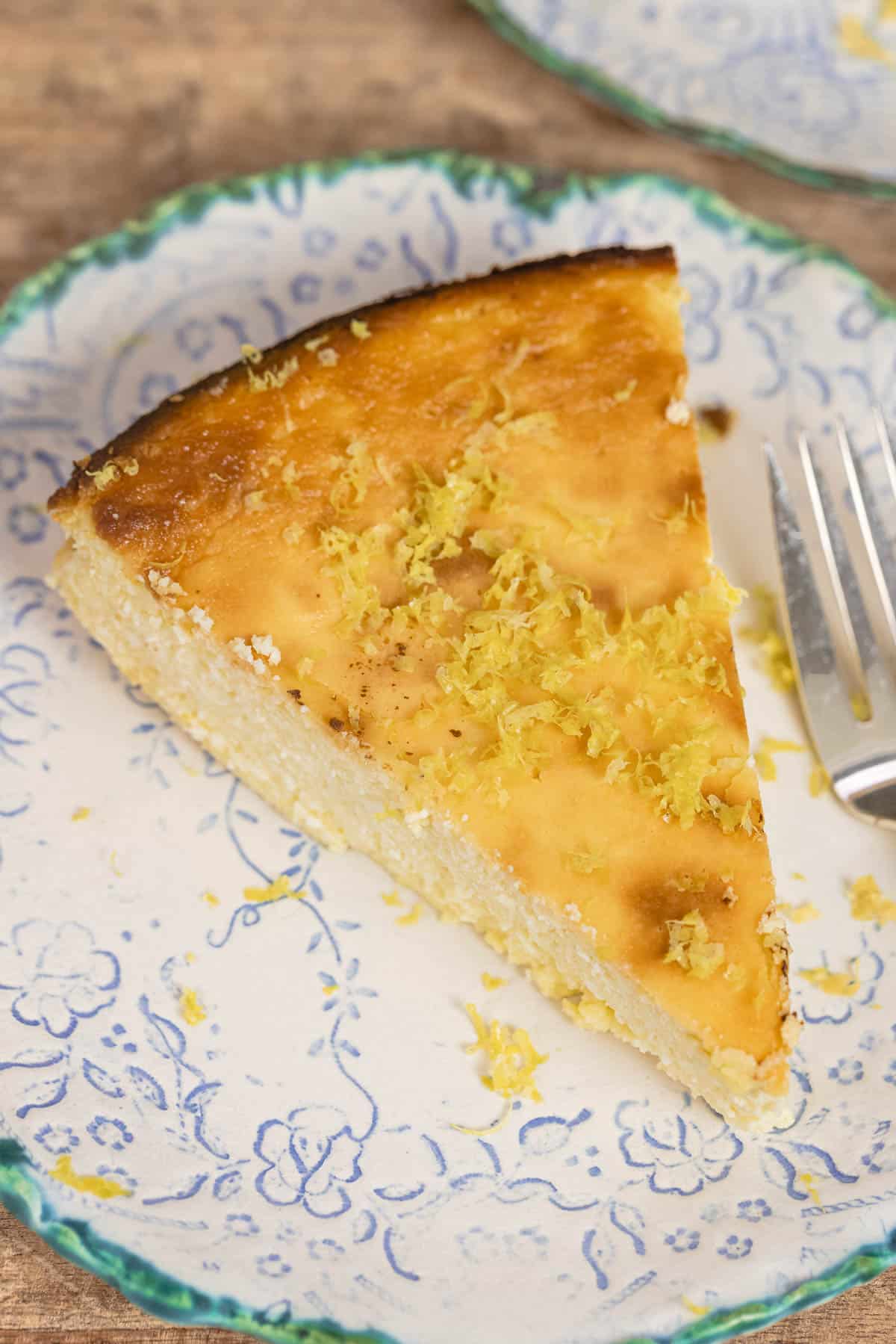
Tips for the best ricotta cheesecake
- Strain the ricotta cheese very well. Straining the ricotta cheese is important to ensure good texture so that the cheesecake will be creamy and not watery. To do this, place a fine mesh sieve over a bowl and line it with cheesecloth or sturdy paper towels. Spoon the ricotta onto the cheesecloth or paper towels, and press on the cheese with the back of a wooden spoon to coax out as much liquid as possible. If you have time, cover the sieve with plastic wrap and allow the ricotta cheese to strain by itself overnight in the refrigerator. Discard the liquid.
- Bring cold ingredients to room temperature. Room temperature eggs and ricotta cheese are good for baking because they will blend more evenly in batters resulting in a smoother, creamy consistency. Budget about 30 minutes to 1 hour for the eggs and cheese to sit on the counter till you’re ready to use them. (Cold eggs can result in a lumpy cheesecake batter.) Room temperature ricotta cheese is also good for giving the batter a smooth consistency because it blends easier with the other ingredients when it isn’t cold. Your cheesecake batter will be smooth and creamy.
- Mix the ricotta cheesecake batter for a full 10 minutes. Whipping the batter continuously on medium-low speed will help incorporate more air into the batter, resulting in a lighter, more airy Italian cheesecake.
- Use a springform pan and do NOT forget to oil (or butter) the bottom and sides of the pan. Springform pans come in two parts that you can separate, making them really convenient for baked goods that can’t be inverted (like cheesecake!). Just don’t forget to brush the bottom and sides with some olive oil (or butter, if you must) so the cheesecake doesn’t stick to the baking pan. (This is from personal experience! You don’t want the sides of your cake to pull out when you unhook the pan.)
- Use a thermometer or the wobble test to check whether the baked ricotta cheesecake is done. The internal temperature of a baked cheesecake will be 150 degrees F when it is ready. But if you don’t want to poke holes into the top of your cheesecake, use the wobble test instead. Simply tap the side of the baking pan firmly with a spoon. An undercooked cheesecake will be very jiggly and still slosh around like liquid. A cooked cheesecake will have a slight jiggle, but will be mostly firm. It will also continue to cook a little once you remove it from the oven.
- Cool completely before serving! Allow the cake to cool completely in the springform pan at room temperature, then stick it in the fridge for at least 6 to 8 hours or overnight. This will allow the cheesecake to fully harden before you begin slicing it, and it will also enhance the flavor.

Cheesecake serving tips
As mentioned earlier, you’ll need to allow the cake to cool completely overnight in the fridge. About 15 minutes before serving, take the cheesecake out of the fridge and remove the springform pan. Slice the no-crust cheesecake with a sharp (not serrated) knife. It helps to keep a pitcher of water nearby to clean the knife and wipe it between slices.
You can serve this cake plain with just a sprinkle of lemon zest (or orange zest). You can also add some fresh berries or a sweet-tart berry compote to top your Italian cheesecake for a pop of color.
Can I freeze ricotta cheesecake?
Yes! You can freeze this crustless cheesecake. Leftovers can keep in the fridge, in a tightly closed container, for up to 5 days. But to freeze it, simply wrap the chilled baked cheesecake tightly in plastic wrap and also a layer of foil and freeze for up to 2 months. You can also wrap and freeze individual slices so you only thaw as much as you need at a time. Thaw overnight in the fridge. If thawing out individual slices, they may only need a few hours in the fridge to thaw completely.
More cake recipes
Browse all Mediterranean Recipes
Visit Our Shop
Italian Lemon Ricotta Cheesecake Recipe
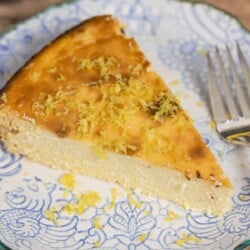
Ingredients
- 3 pounds whole milk ricotta cheese
- 8 large eggs
- 1 ¼ cup sugar
- 1 teaspoon vanilla extract
- Zest of 3 lemons
- Olive oil to coat the pan
Instructions
- Preheat the oven to 425 degrees F.
- Strain the ricotta cheese and discard the liquid.
- In the bowl of a standing mixer fitted with a blade, add the cheese, eggs, sugar, vanilla extract, and lemon zest. Mix, starting on low and increasing to medium-low (2 on the KitchenAid mixer) speed for 10 minutes. The mixture will look light and fluffy, like a batter of sorts. If using a hand-mixer, keep the speed low. If using a wooden spoon, mix continuously until fluffy.
- Coat the bottom and sides of a 9″ springform pan with olive oil (this is very important or the cake will stick to the pan). Place the springform pan on a large sheet pan.
- Pour the batter into the springform pan and give it a little shake.
- Bake for 30 minutes at 425 degrees F, then turn the heat down 375 degrees F and bake for another 40 to 45 minutes or until the batter has mostly firmed up and the top of the cake has gained a nice golden brown color (the cake may still jiggle slightly when you take it out, but it will become fully firm once cooled).
- Remove from the heat and allow the cake to cool completely (1 to 2 hours) and then cover with plastic wrap and refrigerate for at least 6 hours. If you have the time, it’s best to refrigerate the cake overnight).
- When the cake is fully chilled, you can remove the springform pan. Slice and serve! And if you like, add a bit more lemon zest over each piece.
Notes
- Strain the ricotta cheese very well for a creamy, not watery, cheesecake batter. Bring ingredients to room temperature before baking.
- Mix the batter for at least 10 minutes for an airy cheesecake.
- Use a springform pan and don’t forget to oil the bottom and sides!
- Use a thermometer or the wobble test to check when the ricotta cheesecake is done. Cooked cheesecake will have an internal temperature of 150 degrees F. Or simply tap the side of the springform pan with a spoon. Uncooked Italian cheesecake will slosh around, while cooked cheesecake will have a very slight jiggle, but will be mostly firm.
- Allow the cheesecake to cool completely before serving! For best results, allow the cheesecake to cool completely at room temperature in the springform pan, and then cover and chill in the refrigerator overnight.
- Storage: Ricotta cheesecake will keep in the fridge for up to 5 days. It can also be frozen for up to 2 months. Wrap it tightly in plastic wrap and then foil. You can also freeze individual slices. Thaw overnight in the fridge.
- Visit our Shop to browse Mediterranean ingredients including extra virgin olive oils and all-natural and organic spices.

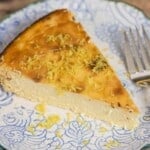
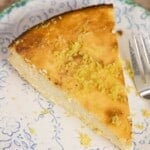
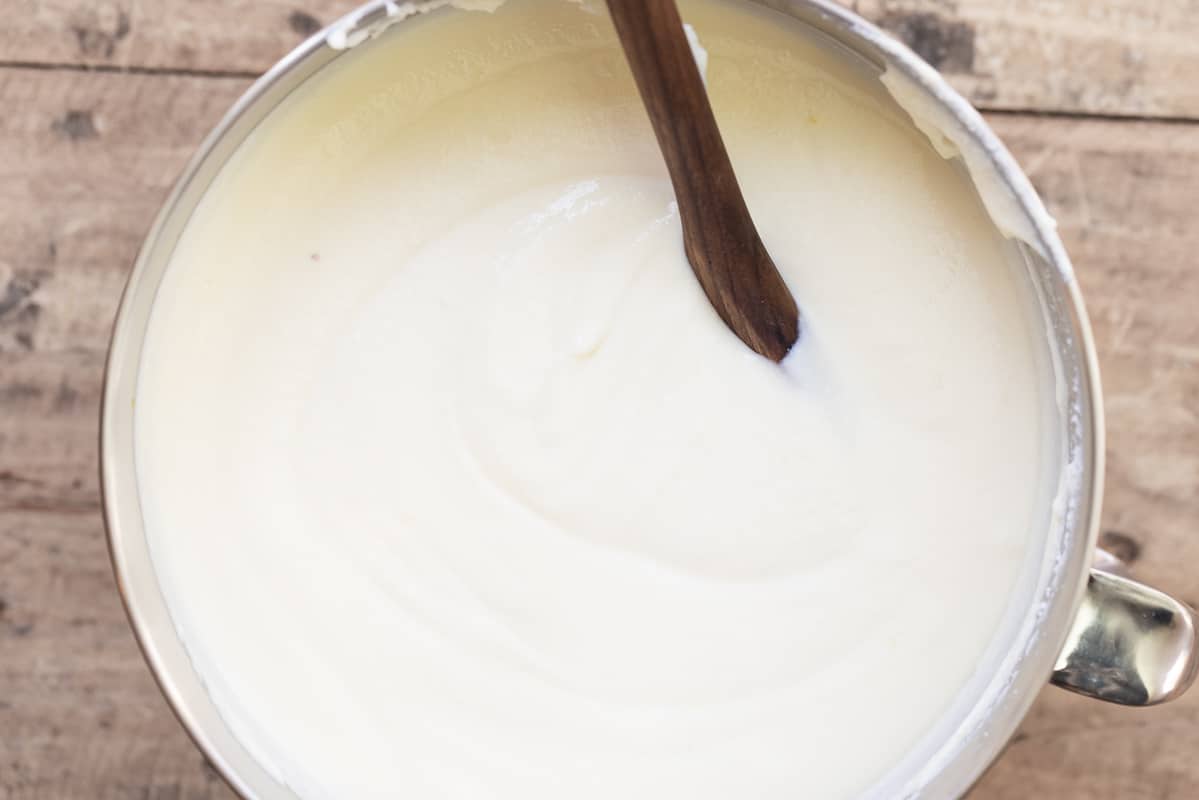
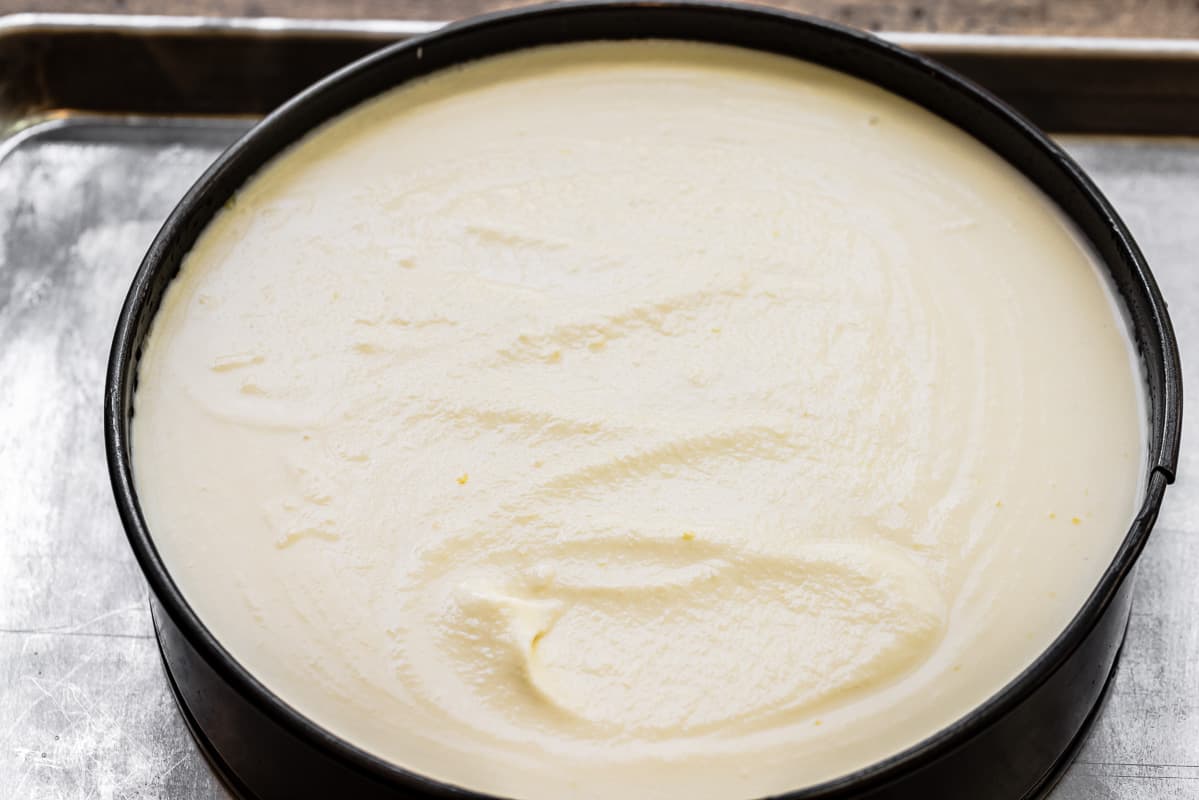
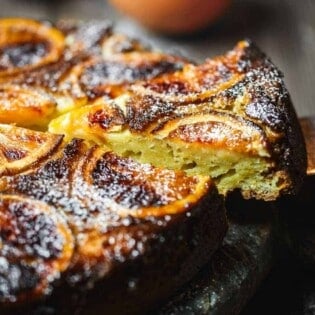
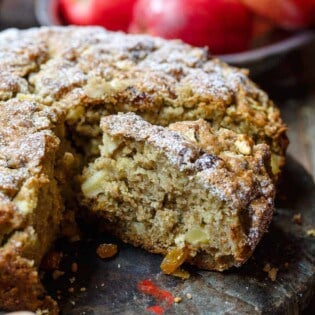
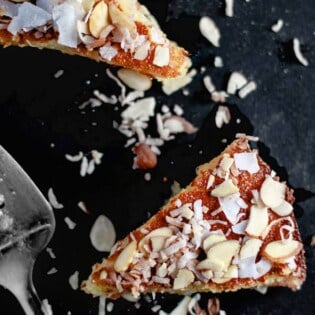
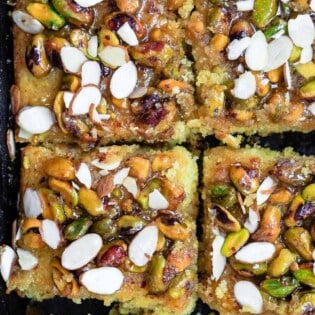
I remember my mom making this. Haven’t thought much about it until I just seen it. I’m definitely going to try it.
Hope you love it!
This looks delicious. Do you think it would be possible to half the sugar amount? Would that change the texture? I’ve done this with loaf pan cakes without any issues.
Thank you,
Virginia
Hi, Virginia, as we haven’t tested this recipe with less sugar. If you give it a try, we’d love to hear your thoughts!
Can I add a crust and get the same results in terms of cooking time and doneness?
Hi, Nancy. We’ve never tested this one with a crust, so hard to say. If you give it a try, would love to hear your thoughts!
Can you cook this in a regular pie pan?
Hi, Marleen. No, we really recommend using a springform pan here.
This was amazing. My wife has had to go Gluten free and really missed luxury desserts, until this recipe. It’s light with just the right amount of lemon flavor. When I was making it I was tempted to add some lemon juice to boost the flavor, I’m really pleased I left it per the recipe.
Thanks, Andrew!
Hi Suzy. Can I use creamcheese instead of ricotta cheese for the lemon cheese cake. We do not get ricotta cheese in our town at the shops.
cake was delicous. the only problem that arose was that the cake started to rise and bubble up on the outer rim whjle cooking it. it did not settle back down. the middle was fine. what could of caused this. please elaborate. cooked 425 degrees for 30 minutes. 375 degrees for 45 minutes. cooled for 2 hours. then refrigerated overnight. what did i do wrong.
thanks
franco
Hi, Franco. Sometimes the bubbling can occur due to over-mixing of the batter. So, I would just keep an eye on that the next time you give this recipe a try. So glad it still tasted delicious, though :).
This was delicious! It came out perfectly. I made a berry sauce ( blueberries, blackberries, raspberries) to put on top. It complimented the lemon flavor nicely.
What a wonderful addition! Thanks for the tip, Julie!
When you say use a stand mixer with a blade, do you mean a paddle or whisk attachment?
Hi, Laurie. I use the paddle for this one. Enjoy!
The Italian ricotta cheesecake was a HUGE success with my church family! Two friends asked me for the recipe! 😁
Yay! Thanks so much, Tanya!
Would this be ok if I omit the lemon? Not a huge fan of desserts that are super lemony
Hi, Mish. Sure, I think that would probably be fine. I’ve also seen recipes using orange zest, so that may be a good substitute. Just a note, this actually is not overly lemony. I feel like the zest just gives a nice hint of the flavor.
Will try to make this low carb by switching out the sugar for monkfruit or another sweetener. Also I’ll make half the recipe in a smaller pan as we’re empty nesters Thank you for the recipe.
Would love to hear how your adaptations work out when you give this one a go, Rebecca!
Made for Easter dessert, baking now. Soooo excited. Wish we didn’t have to discard milk squeezed out. Wondering if could beat along with heavy cream & a little sugar for topping?
Hi, Maryellen! Hope you enjoyed the cheesecake. That is an interesting idea for using up the extra milk. I have never tried that before, so I’m not really sure if it would work well or not. Would love to hear if it turned out for you!
I made this for Easter dessert and it was delicious. Light, airy and perfectly lemony. I also don’t like dense fussy cheesecakes. This couldn’t have been an easier to bake either. Thanks!
Thanks so much, Kristen!
Cant wait to try this….do you think I could make 1/2 the recipe?
TY (from Montreal)
Hi, Rose. That may be fine, but it’s not something I’ve tested with this recipe. If you give it a try, could you please stop by and let us know how it went?
My mom was 100% Italian and I recall her making a simple crustless ricotta & lemon cheesecake while I was growing up that was scrumptious. I limit my carbs now, so will substitute monk fruit for the sugar but I’m really looking forward to making and enjoying this recipe. All of your recipes are great and I’m certain this one will be as well. Thanks Suzy!
I love regular cheesecake, but it can be overly rich and too sweet a lot of the time. This ricotta cheesecake is a great alternative when I want to indulge in cheesecake but not eat something too heavy. It’s so yummy! The instructions are really clear, too.
So glad you enjoyed it!
My husband, guests and I loved this recipe! I used 2 large lemons vs. 3 in the recipe and it seemed to have the right amount of lemon.
Great to hear! Thanks for sharing, Ronda!